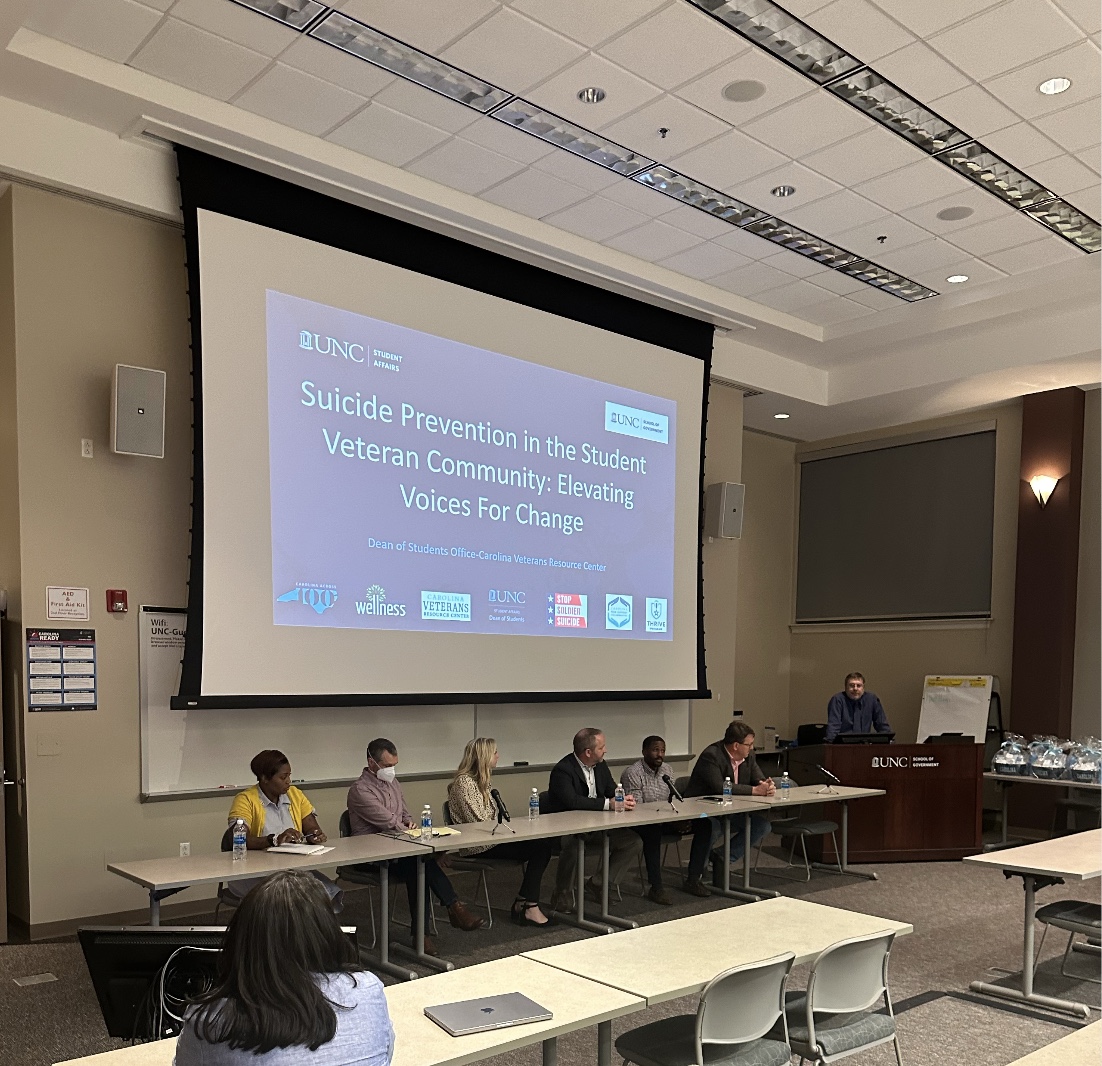School of Government hosts two events for veterans in November 2023
In honor of veterans’ service, the UNC School of Government hosted two notable events to recognize the service of United States Armed Forces members in November 2023.
The first was a discussion for faculty and staff, held on Monday, Nov. 6, courtesy of the School’s Committee for an Inclusive Workplace. Faculty member Chuck Szypszak and Rob Palermo, program director of the Carolina Veterans Resource Center, discussed the military experience and veterans' transition to academic life and civilian careers.
Szypszak’s presentation focused on his personal experiences as a former U.S. Marine making the transition first to law school, then to private legal practice, and later to academia. He spoke of his challenges being older than the average student and the vast amounts of responsibility he had under his belt compared to some of his law school classmates.
Szypszak also talked about grappling with other assets he gained in the Marine Corps, such as his team-based and service-oriented mindset, his work ethic, and willingness to disagree with others–which were not always shared with others in his professional realm.
He designed and led an MPA class on the topic of leadership lessons learned in military service as well as authored a book on the topic. He also has volunteered as an instructor for the Warrior-Scholar Project, which gives enlisted service members the learning strategies and academic skills they need to operate as effectively in college as they do in the military.
A former U.S. Coast Guard service member, Palermo leads UNC’s Green Zone training, in which enrolled UNC faculty and staff learn more about the military-affiliated student experience.
During his portion of the talk, Palermo shared some facts and figures about the military presence in NC. As one of the largest active-duty populations in the country, and because of the large military presence in the state, many of the state’s veterans have specialized training and possibly have served in combat.
These important life experiences deserve understanding and appreciation in academia, Palermo said, especially as higher education faculty and staff members in support-oriented positions.
The School of Government also hosted a panel discussion, co-sponsored by Carolina Across 100, to discuss strategies to stem suicide among veterans on Thursday, Nov. 9.
As part of its “Our State, Our Wellbeing” 12-month campaign, Carolina Across 100 aims to identify and implement strategies to improve mental health and reduce the number of suicides in North Carolina.
Additional co-sponsors of the events included the UNC Dean of Students, Carolina Peer Support Collaborative, UNC Student Wellness, Stop Solider Suicide, THRIVE Program, and the Matthew Gfeller Center.
During the “Suicide Prevention in the Student Veteran Community: Elevating Voices For Change” panel, moderated by UNC alumnus and U.S. Army veteran Daniel Kutuzov, panelists spoke of the need to prioritize and elevate self-care and mental health resources among a student veteran population that contends with relatively high rates of suicide.
The full panel included:
- Sarah Ann Mashburn, LCSW—THRIVE Program, Stop Soldier Suicide
- Dr. Shawn Kane—THRIVE Program
- Chuck Eastman—Stop Soldier Suicide/Roger-Director of Strategic Partnerships
- Dr. Patrick Sullivan, Director, UNC Suicide Prevention Institute, School of Medicine
- Sheree Stewart, UNC Master of Social Work student veteran
- Kenneth Harris, Doctor of Social Work student (active duty U.S. Army soldier)
A 2021 statistic revealed that 44 percent of veterans revealed they had considered taking their own lives after joining the military, compared to nine percent who expressed suicidal thoughts prior to service.
Stewart, a veteran who is now enrolled in the UNC Master of Social Work program, referenced the challenges of booking mental health appointments—particularly in a timely manner—in the military health system and suggested a more comprehensive approach to evaluating mental health would be imperative to overcoming the stigma of mental health issues.
“We need to prioritize mental health to be just as important as physical health,” she said. “We need to consider the whole wellbeing of a service member before sending them out to do their jobs.”
Mashburn, of the Stop Soldier Suicide program, spoke to the audience of warning signs many military members commonly display when experiencing suicidal ideation. These include:
- Loss of interest in things they used to care about
- Giving things away
- Sudden decline in functioning
- Change in appearance, hygiene
- Talking about feeling hopeless/helpless
- Talking about suicide and/or what it would be like to die
- Increased irritability
- Visiting or calling people to say goodbye
- Withdrawal and isolation
- Suddenly happier, after a long, deep depression
- Increased risk-taking behavior
- Hoarding pills, hiding weapons
Kane (THRIVE) closed out the event, praising recent progress made in the veteran community when combatting rates of suicide: recent U.S. Veterans Affairs data show that there were 343 fewer veterans that died by suicide in 2020 than in 2019.
While he stressed the importance of celebrating this progress, he also reiterated that there are many strides left to be made when the stakes are so high.
“You don’t always know the wins. You know the losses. Everyone knows when the system fails, and one is too many.”
Published November 21, 2023



